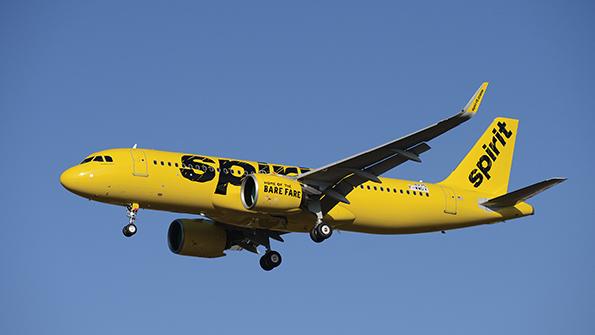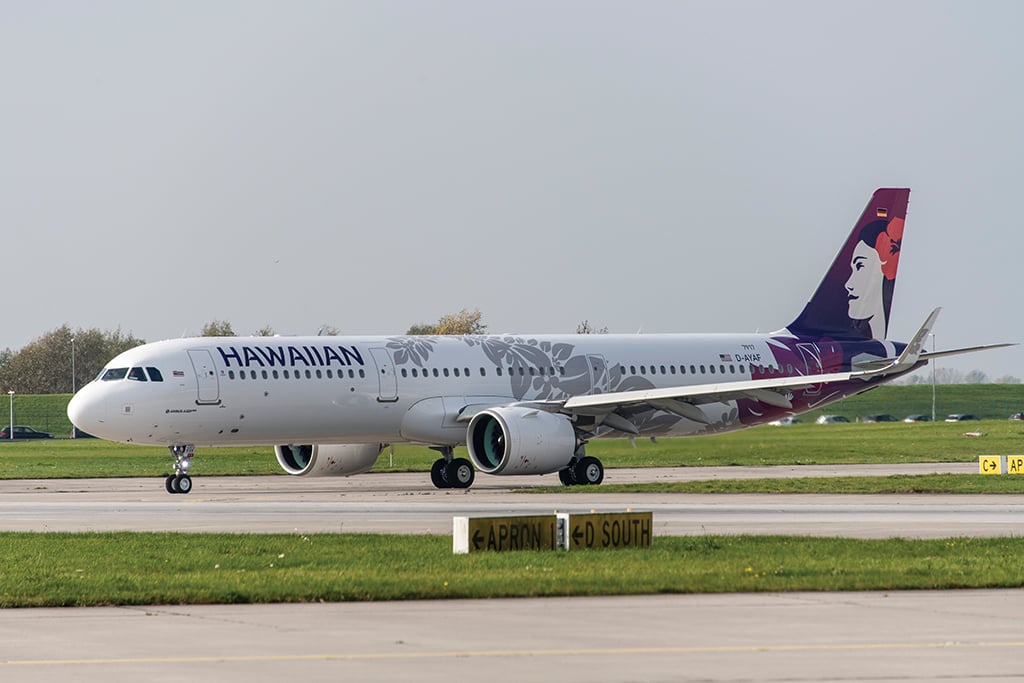Pratt’s Unexpected Wave Of GTF Checks Roils Airlines And Aftermarket

Spirit Airlines had three A320neos on the ground at the end of August.
Airlines and maintenance providers are bracing for a surge in Pratt & Whitney PW1000G-series engine overhauls that threatens to press an already difficult situation into a capacity crisis.
The initial round of shop visits for the PW1000G geared turbofan (GTF) family of engines is underway—and earlier than expected. This wave of about 140 engines coming off wing by the end of September is just the beginning.
Another 600 engines must be pulled in the next 6-7 months as they reach revised inspection thresholds set by Pratt. The checks are for signs of cracks in Stage 1 and 2 high-pressure turbine (HPT) and high-pressure compressor (HPC) disks containing contaminated powder metal (PM) that was incorporated during manufacturing.
- Engine-maker aims to take 700 engines off wing by early 2024
- Nearly 10% of the affected fleet has been grounded for other reasons
All the initial checks will occur on the PW1100Gs that power Airbus A320neos. Accelerated inspections might come for the A220’s PW1500Gs and Embraer E190-E2-series PW1900Gs, but RTX executives expect most of the disruption to come in the A320neo fleet due to its size.
The wave of unexpected inspections, on top of 500 or so already scheduled for checks, would be challenging enough for a fleet with high reliability. But because of the GTF family’s years of durability problems, the fleet and Pratt’s small but growing network of authorized repair shops had faced considerable difficulties even before Pratt’s latest round of bad news.
An Aviation Week analysis shows that 175 Pratt-powered A320neos, or about 13% of the fleet, were on the ground at the end of August. Of these, 146 of them had not moved since at least June 1, suggesting they are victims of the durability issues and related parts shortages.
These figures include the 49-aircraft fleet of India’s Go First, which stopped flying in May for financial reasons and is working on a relaunch plan. Even factoring out Go First—many of its aircraft were on the ground awaiting parts when the airline shut down—about 9% of the Pratt-powered A320neo fleet was unavailable on Sept. 1.

The CFM International Leap-powered A320neo family’s comparable numbers were about 60 aircraft, or 4% of the fleet.
The upcoming surge in PW1100G engine removals will quickly worsen the Pratt fleet’s already poor figures. Each check must be done off wing and requires a trip to an overhaul shop for each engine. While the inspections are not particularly labor-intensive, getting the engines off and on wing with a trip to an engine shop in between takes time. The lack of available shop capacity means turnaround times—measured from removal to reinstallation on wing—could approach 300 days, executives at Pratt parent RTX, formerly Raytheon Technologies, warned in early September (AW&ST Sept. 18-Oct. 1, p. 18). Typical narrowbody engine turn times are closer to 60 days, but times were increasing just before the downturn and have not lessened as demand has outstripped the supply chain’s ability to keep up.
Pratt’s goal is to conduct extensive overhauls to help keep the engines flying as long as possible after the premature inspections. This will require swapping the turbine and compressor disks with parts made after the PM issue was resolved—something Pratt says will not be possible for every engine. Many engines that leave shops without new disks will need follow-up checks every year or so, based on Pratt’s revised inspection intervals.
Peak grounding is expected sometime in the first half of 2024, when 650 GTF-equipped A320neos—nearly half the Pratt-powered A320neo fleet—could be awaiting engines or parts.
Concerns about spare parts availability rival those focused on capacity. Affected engines are the Block C standard, while Pratt and its partners are transitioning to Block D. Several industry sources tell Aviation Week that operators are worried there will not be enough of the spare parts that conform to the C standard when they are needed over the next year and are questioning whether the manufacturer will respond accordingly.
Meanwhile, Pratt must also focus on producing new engines that will not have nagging durability issues.
The PW1100G Block D standard, which focused on hot-section durability improvements, began rolling out in late 2020. But the design improvements fell short in one key area: combustor durability. Although the revised combustor cooling hole pattern and size helped double time on wing compared with the previous standard, a thermal barrier coating problem premature erosion inside combustor liners continues.
That has Pratt working on two more upgrade phases: Block D.1, set for introduction next year, will include upgraded airfoil coatings, better hot-section cooling and air seal upgrades; and Block D.2, planned for 2025 onward, adds an additional series of improvements to airfoil coatings and hot-section durability upgrades. Pratt is also introducing phased oil system improvements on the PW1500G and PW1900G to address durability issues specific to those models.
While Pratt juggles new-build engines that stay on wing longer and enough spares to support an old-build standard that now needs more spare parts than originally projected, airlines must make due as Pratt comes for hundreds of powerplants that need earlier-than-expected inspections.
Many carriers and lessors are moving engines around, given that pairing engines from outside the affected population limits the number of aircraft that have to be put on the ground. The tactic creates more work but also keeps more aircraft flying.
Longer term, airline sources say it is now nearly impossible to find secondhand A320s to purchase or lease for the next summer season.
Some customers are also concerned that the PW1100G Advantage could be seriously delayed. The Advantage, yet another configuration step change, is to be phased into new production beginning in 2024 and will become the standard GTF variant over time.
As Pratt and operators work to manage repair demands, the short- and long-term ramifications on GTF-capable maintenance, repair and overhaul (MRO) shops are still coming into focus.
The expectation from the engine MRO segment is that the GTF will eventually return to a competitive level once Pratt and its partners iron out the engine family’s durability and parts availability issues. Although the OEM’s admitted shortcomings on maturity testing during the program’s development phase helped set the stage for an engine availability crisis, the scale of the program’s delivery ramp-up is seen as the biggest driver.
“The ramp-ups for the GTF and Leap have been so rapid compared to previous generations of aircraft that there’s two orders of magnitude that have had a greater impact as a result,” said Keith Brown, group head of procurement for engines, MRO and aircraft interiors at International Airlines Group, parent company of Aer Lingus, British Airways, Iberia, Level and Vueling.
Claims that airlines were somewhat naive in their risk assessments of not just the GTF but also the Leap engine program are valid to some degree, but Brown said orders were dictated by the choice of only two engines in the new-generation narrowbody aircraft market.
“If you needed the fleet, you needed to buy the aircraft to pick one of those two engines,” he said during a panel discussion at the recent Aviation Week Aero-Engines Europe conference in Madrid.
The panel—while not deeming it too soon for operators to abandon the program entirely—agreed that a long-term change whereby operators either order their engines separately or later from their airframe commitments could be possible.
Despite the unexpectedly high demand created by the groundings and despite what some maintenance providers say is a lack of sufficient tooling for the GTF, MRO providers are moving ahead with planned engine inductions. But given the predicted spike in early inductions in the coming months, they are carefully considering how to manage shop capacity to ensure that the PW1000G problems do not drain resources from other programs.
Iberia Maintenance, the MRO affiliate of Spain-based Iberia Airways, expects to induct its first GTF engine at its Madrid facility in November—about a year after announcing plans to begin servicing PW1100G engines.
“It’s going to feed the capacity we will have booked for the GTF,” said Enrique Robledo, chief technology officer at Iberia Maintenance, of the early inspections. “It is a new engine, and we are building a separate workflow for this engine than the rest. We have determined capacity isolated from the rest of the shop, so the capacity of the GTF won’t influence the rest of the shop.”



